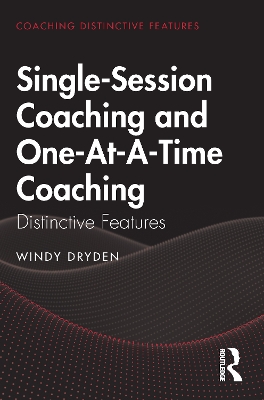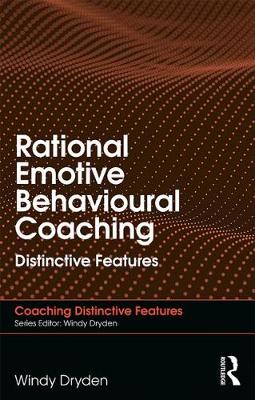Coaching Distinctive Features
2 total works
In Single-Session Coaching and One-At-A-Time Coaching: Distinctive Features, Windy Dryden presents a clear and accessible overview of the theory and practice of Single-Session Coaching and One-At-A-Time Coaching (SSC/OAATC). Presented in the highly accessible Distinctive Features format, Dryden explores how these approaches allow coaches and clients to tackle problems and find solutions quickly and flexibly.
Single-Session Coaching and One-At-A-Time Coaching is split in two parts, providing a complete understanding of both the theory and practice of SSC/OAATC, as well as clearly examining key topics, including the foundations of SSC/OAATC, what makes a good SSC/OAATC coach and coachee, common misconceptions, preparing for and structuring a session, and considering significant coachee variables. It explains key terminology, such as the difference between Problem-Focused and Development-Focused SSC/OAATC, and portrays these differences in useful case studies to show the benefits of each for individual clients. Finally, it concludes with details on following up with the coachee, including key questions to ask.
With case studies throughout, this approach can be applied in various clinical settings, such as primary care, and non-clinical settings, such as voluntary sectors, and is ideal for time-limited scenarios in comparison to other, more time-consuming, coaching methods. This will be an invaluable tool for coaches in practice and in training, as well as for academics and students of coaching.
This concise and accessible book introduces the 30 Distinctive Features of Rational Emotive Behavioural Coaching, also known as REBC, an approach which applies the principles of REBT to coaching. Divided between 10 theoretical and 20 practical features, the book covers a range of topics, including meaning and values, development, the working alliance, dealing with obstacles and common coachee problems.
The book sets out two different approaches: development-focused REBC, which concentrates on the coachee’s areas of development, and problem-focused REBC, which concentrates on the coachee’s practical and emotional problems of living. Within the latter category, the book also distinguishes between practical problem-focused REBC and emotional problem-focused REBC. Rational Emotive Behavioural Coaching: Distinctive Features will be an essential reference for anyone seeking to understand the key features of this unique approach to coaching.

